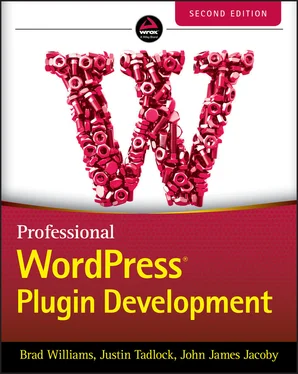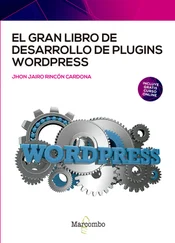1 COVER
2 FOREWORD FOREWORD This book will teach you how to develop for WordPress. WordPress has, over the past two decades, grown into the CMS that powers more than one‐third of all websites. If you're proficient at WordPress development, you'll never be out of a job again. Starting out as a simple blogging system, over the last few years WordPress has morphed into a fully featured and widely used content management system. It offers individuals and companies worldwide a free and open source alternative to closed source and often very expensive systems. When I say fully featured, that's really only true because of the ability to add any functionality needed in the form of a plugin. The core of WordPress is simple: you add in functionality with plugins as you need it. Developing plugins allows you to stand on the shoulders of a giant: you can showcase your specific area of expertise and help users benefit while not having to deal with parts of WordPress you don't care or know about. When I wrote the foreword of this book's first edition, nine years ago, I'd just started my own company. That company has since grown to consist of 100+ people, and our plugins are used on more than 10 million sites—all through the power of open source and plugins. I wished that when I started developing plugins for WordPress as a hobby, almost 15 years back, this book had been around. I used it as a reference countless times since, and I still regularly hand this book to new colleagues. The authors of this book have always been a source of good information and wonderful forces in the WordPress community. Each of them is an expert in his own right; together they are one of the best teams that could have been gathered to write this book, and I'm glad they're here for a second edition. WordPress makes it easy for people to have their say through words, sound, and visuals. For those who write code, WordPress allows you to express yourself in code. And it's simple. Anyone can write a WordPress plugin. With this guide in hand, you can write a plugin that is true to WordPress’ original vision: code is poetry. Happy coding! Joost de Valk Yoast.com
3 INTRODUCTION INTRODUCTION Dear reader, thank you for picking up this book! You have probably heard about WordPress already, the most popular self‐hosted content management system (CMS) and blogging software in use today. WordPress powers literally millions of websites on the Internet, including high‐profile sites such as TechCrunch and multiple Microsoft websites. What makes WordPress so popular is that it's free, open source, and extendable beyond limits. Thanks to a powerful, architecturally sound, and easy‐to‐use plugin system, you can customize how WordPress works and extend its functionalities. There are already more than 55,000 plugins freely available in the official plugin repository, but they won't suit all your needs or client requests. That's where this book comes in handy! As of this writing, we (Brad, Justin, and John) have publicly released more than 100 plugins, which have been downloaded millions of times, and that's not counting private client work. This is a precious combined experience that we are going to leverage to teach you how to code your own plugins for WordPress by taking a hands‐on approach with practical examples and real‐life situations you will encounter with your clients. The primary reason we wanted to write this book is to create a preeminent resource for WordPress plugin developers. When creating plugins for WordPress, it can be a challenge to find the resources needed in a single place. Many of the online tutorials and guides are outdated and recommend incorrect methods for plugin development. This book is one of the most extensive collections of plugin development information to date and should be considered required reading for anyone wanting to explore WordPress plugin development from the ground up.
WHO THIS BOOK IS FOR WHO THIS BOOK IS FOR This book is for professional web developers who want to make WordPress work exactly how they and their clients want. WordPress has already proven an exceptional platform for building any type of site from simple static pages to networks of full‐featured communities. Learning how to code plugins will help you get the most out of WordPress and have a cost‐effective approach to developing per‐client features. This book is also for the code freelancers who want to broaden their skill portfolio, understand the inner workings of WordPress functionality, and take on WordPress gigs. Since WordPress is the most popular software to code and power websites, it is crucial that you understand how things run under the hood and how you can make the engine work your way. Learning how to code plugins will be a priceless asset to add to your résumé and business card. Finally, this book is for hobbyist PHP programmers who want to tinker with how their WordPress blog works, discover the infinite potential of lean and flexible source code, and learn how they can interact with the flow of events. The beauty of open source is that it's easy to learn from and easy to give back in turn. This book will help you take your first step into a community that will welcome your creativity and contribution. Simply put, this book is for anyone who wants to extend the way WordPress works, whether it is for fun or profit.
WHAT YOU NEED TO USE THIS BOOK WHAT YOU NEED TO USE THIS BOOK This book assumes you already have a web server and WordPress running. For your convenience, it is preferred that your web server runs on your localhost, as it will be easier to modify plugin files as you read through the book, but an online server is also fine. Code snippets written in PHP are the backbone of this book. You should be comfortable with reading and writing basic PHP code or referring to PHP's documentation to fill any gaps in knowledge about fundamental functions. Advanced PHP code tricks are explained, so you don't need to be a PHP expert. You will need to have rudimentary HTML knowledge to fully understand all the code. A basic acquaintance with database and MySQL syntax will help with grasping advanced subjects. To make the most of the chapter dedicated to JavaScript and Ajax, comprehension of JavaScript code will be a plus.
WHAT THIS BOOK COVERS WHAT THIS BOOK COVERS As of this writing, WordPress 5.5 is around the corner, and this book has been developed alongside this version. Following the best coding practices outlined in this book and using built‐in APIs are keys to future‐proof code that will not be deprecated when a newer version of WordPress is released. We believe that every code snippet in this book will still be accurate and up‐to‐date for several years, just as several plugins we coded many years ago are still completely functional today.
HOW THIS BOOK IS STRUCTURED HOW THIS BOOK IS STRUCTURED This book is, to date, one of the most powerful and comprehensive resources you can find about WordPress plugins. Advanced areas of the many WordPress APIs are covered, such as the REST API, cron jobs, and custom post types. This book is divided into three major parts. Reading the first five chapters is required if you are taking your first steps in the wonders of WordPress plugins. Chapters 6 through 9 will cover most common topics in coding plugins, and understanding them will be useful when reading subsequent chapters. The remaining chapters cover advanced APIs and functions, can be read in any order, and will sometimes refer to other chapters for details on a particular function.
CONVENTIONS CONVENTIONS To help you get the most from the text and keep track of what's happening, we've used a number of conventions throughout the book. WARNING Boxes with a warning label like this one hold important, not‐to‐be‐forgotten information that is directly relevant to the surrounding text. NOTE The note label indicates notes, tips, hints, tricks, and asides to the current discussion. As for styles in the text: We italicize new terms and important words when we introduce them. We show keyboard strokes like this: Ctrl+A. We show filenames, URLs, and code within the text like so: persistence.properties. We present code in two different ways: We use a monofont type with no highlighting for most code examples. We use bold to emphasize code that is particularly important in the present context or to show changes from a previous code snippet.
Читать дальше












